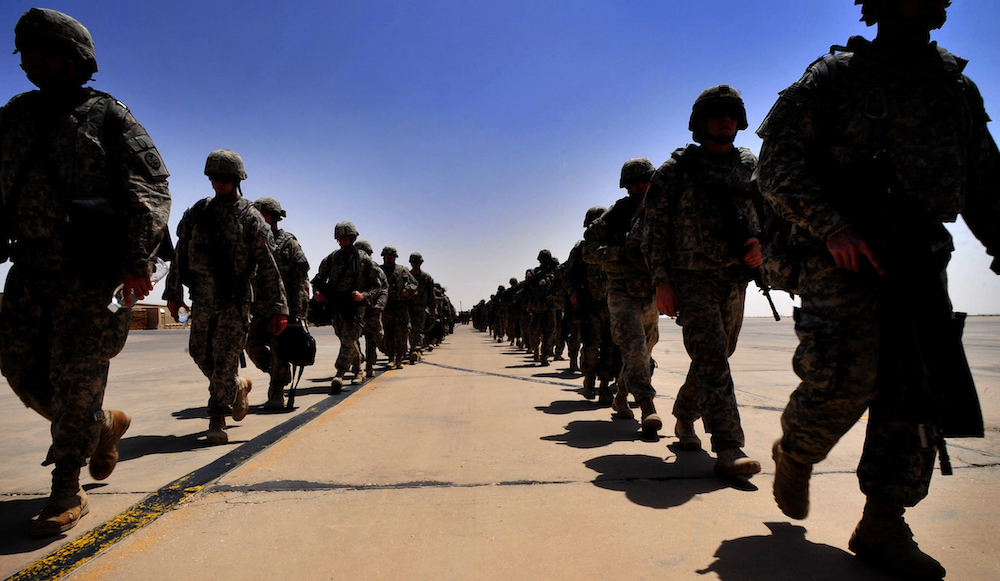


Editor’s Note: This is an opinion column. The thoughts expressed are those of the author.
It began in 2013, with a bullet in an envelope and a scrawled threat: “Leave now.”
My mother returned from the bazaar one day to find our home’s HVAC unit destroyed and the terrifying message left among the severed wiring. It was a stark reminder that anti-American insurgents now controlled our hometown of Babylon, about 60 miles south of Baghdad.
We knew why we were being threatened: after Iraq’s liberation ten years earlier, when I was just a child, my family had begun aiding the U.S. military.
In theory, Iraqis targeted for helping U.S. troops are eligible to receive refugee status and resettle in the United States. But President Donald Trump has effectively shuttered the program. More than 9,800 Iraqis were admitted to the United States in 2016, but just 161 people were resettled in the past 12 months.
Now, seven years after the threats began, I remain one of at least 110,000 Iraqis who are still waiting and fearing for our lives daily.
My family always loved America. We grew up watching Hollywood movies, and when U.S. troops were posted in my high school, I was curious and chatted with them. Some of my cousins worked with the Army as translators, while my brother, a few years older than me, worked for the U.S. military in our hometown. He filed daily reports on everything from grocery prices to Friday sermons at the local mosque — vital intelligence that helped troops understand our community.

Later, my brother moved to Baghdad, working in the Green Zone with a Defense Department contractor to set up IT systems, help with procurement, and manage logistics. He eventually became an HR manager with the U.S. Embassy, supervising 120 people and vetting local workers to ensure that insurgents couldn’t establish a foothold in the Green Zone.
It was a public role, and thus a dangerous one: One of my cousins was killed in 2006 when insurgents ambushed the military convoy he was traveling with. But my brother’s American contacts promised they would protect us. If we ever felt endangered, they said, we’d be allowed to resettle safely in the United States.
After the threats started, we moved in with my grandparents in Baghdad and filed for refugee status in America. It was a slow process, with many interviews and careful vetting. In the meantime, the insurgents found us. One day, men on motorcycles began harassing my mother in the street, then tried to drag my younger brother away. Thankfully locals intervened and prevented the abduction, but the message was clear: in Iraq, we would never be safe.
Fearing more attacks, my older brother—who had filed those weekly briefings — gave up on the refugee process and moved to America on a student visa. In mid-2016, my younger brother and my mother finally received refugee status and joined him in North Carolina. In the meantime, though, I had married and had a baby — and that meant I had to start the lengthy vetting process from scratch.
It’s now been seven years since I first applied for sanctuary. I’ve moved numerous times to stay ahead of the radicals who want to hurt me, my husband, and our young daughter. I’m now living in a town many miles from Baghdad, where my husband and I teach in the local elementary school. We seldom leave the house other than to work, but even that isn’t enough to keep us safe.
I’m often verbally harassed by people who call me an American agent. Last year, I was hospitalized after someone tossed a flash-bang grenade over the wall into my front yard, knocking me to the ground and temporarily blinding me. Even today, I have blurred vision and suffer terrible headaches.

None of us want a free ride. Like 48 percent of Middle Eastern immigrants, I’m college educated and eager to work. My older brother finished graduate school in the United States and is now working for Lowe’s as a data scientist, helping them to serve American consumers more effectively. My mother works in retail, and my younger brother is an engineer for Amazon.
Their contributions aren’t unusual. According to New American Economy, Middle Eastern and North African immigrants pay $16.9 billion in federal, state, and local taxes, shoring up the economy for everyone. I wish that, like my brothers and my mom, I could simply live safely in America, and teach American children, secure in the knowledge that my own child can grow up without fearing for her life.
When my brother began helping the U.S. military, my family supported him. We knew he was putting himself — and us — at risk. But we also knew his work was vital. We were willing to put our lives on the line to keep American soldiers safe and build a free and democratic Iraq.
Now, I can’t help feeling abandoned. I couldn’t in good conscience encourage other people, in Iraq or Afghanistan or anywhere else in the world, to risk their lives for American troops, because I no longer trust President Trump to keep up his end of the bargain.
My brother likes this line from Winston Churchill: you can always count on America to do the right thing — after exhausting all the other possibilities. Maybe things will be different now that President Trump has been voted out of office. Joe Biden says he wants to re-open America’s doors to people seeking refuge and asylum.
I hope and pray this is true, because every day that passes is another day I am looking over my shoulder, wondering if I can keep my family safe. But this isn’t just about what I need. It’s about what America needs. If the United States wants local populations to put themselves and their children at risk in the future, they’ve got to keep their promises now.